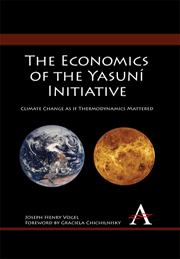Book contents
- Frontmatter
- Contents
- Prologue
- Foreword
- Introduction
- Acknowledgements
- Abbreviations and Acronyms
- The Economics of the Yasuní Initiative
- Chapter 1 Thermodynamics
- Chapter 2 The Tragedy of the Commons
- Chapter 3 The Willful Ignorance of Realpolitik
- Chapter 4 The General Theory of Second Best
- Chapter 5 Through the Bottleneck of a Cowboy Economy
- Conclusions
- Appendix: Annotated YouTube Filmography
- Ordering
- Notes
- Index
Introduction
Published online by Cambridge University Press: 05 March 2012
- Frontmatter
- Contents
- Prologue
- Foreword
- Introduction
- Acknowledgements
- Abbreviations and Acronyms
- The Economics of the Yasuní Initiative
- Chapter 1 Thermodynamics
- Chapter 2 The Tragedy of the Commons
- Chapter 3 The Willful Ignorance of Realpolitik
- Chapter 4 The General Theory of Second Best
- Chapter 5 Through the Bottleneck of a Cowboy Economy
- Conclusions
- Appendix: Annotated YouTube Filmography
- Ordering
- Notes
- Index
Summary
On the 5th of March 2009 I signed a contract with the United Nations Development Programme to be the general evaluator of the Yasuní-ITT Initiative. Yasuní is a UNESCO Biosphere Reserve and a National Park in the Ecuadorian Amazon. Within the park live two indigenous communities who have chosen voluntary isolation, the Tagaere and Taromenane. Below the Park lie the oil fields Isphingo, Tambococha and Tiputini, abbreviated as ITT. Upon learning of just these bare bone facts, I quickly realized that I have been thinking about the economics that justifies the Initiative for almost my entire professional career – long before I knew where Yasuní is and what it will mean for humanity. Drawing on my previous trajectory in the areas of non-equilibrium thermodynamics, biodiversity, and ecocriticism, I offer this short book as the “product” of the consultancy. However, I hope that it will also be an invitation to delve deeper into the arguments referenced in the notes and filmography.
Because climate change is the leading issue of our day, the book is contextualized in the events that transpired from the first of March 2009 to the first of July 2009. These include the G-20 Summit in London, the passage of the “Clean Energy and Security Act of 2009,” the Fifth Summit of the Americas in Trinidad and Tobago, the negotiating session in Bonn of the Fifteenth Conference of the Parties to the United Nations Framework Convention on Climate Change, the formal US recognition of greenhouse gases as pollutants, and the passage of the American Clean Energy and Security Act.
- Type
- Chapter
- Information
- The Economics of the Yasuní InitiativeClimate Change as if Thermodynamics Mattered, pp. xix - xxiiPublisher: Anthem PressPrint publication year: 2010



